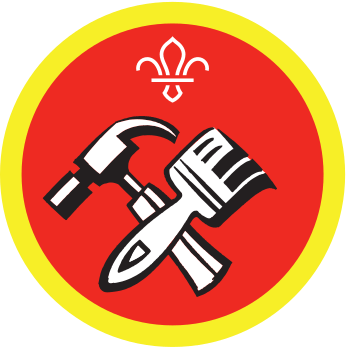Sofa, so good
You’ll need
- Tape measure
- Pens or pencils
- Rulers
- Wood
- Saw
- Sandpaper
- Wood glue
Before you begin
- Make sure everyone has the equipment they need and knows how to safely use it.
Tip top tray
Put your DIY skills to use by making a handy wooden tray for the arm of your sofa. Great for holding cups, snacks or the remote controls and a great way to test out your DIY skills and attention to detail.
- Measure the width of the sofa arm and write this down. Measure the thickness of your piece of wood, double this measurement and add it on to the width of your sofa arm, this will be the width of the top of your tray.
- Mark out a rectangle on the piece of wood to be the tray surface using a pencil and a ruler. Two opposite sides should be the width measurement you created in step one; the remaining two opposite sides should be the length you want your tray to be. Make sure it isn’t too long to fit on the arm!
- Mark out two more rectangles onto the wood to be the sides of your tray. These should be the same length as the top of the tray, and around five centimetres wide.
- Place your piece of wood on a flat, sturdy surface and hold it down with one hand. Make sure the lines to be cut are hanging over the edge of the surface and cut along the lines carefully with a wood saw.
- After the three rectangles have been cut use some sandpaper to smooth any edges or sharp points made by cutting.
- Lay the top of the tray onto a flat surface, take one of the side pieces and place in onto the tray top so it is standing up on its long edge, and the outside edge lines up with the outside edge of the tray top.
- Repeat this with the other side piece on the opposite edge to create the final shape of your tray.
- Using a pencil, mark the position of the side pieces onto the tray top and set them to one side.
- Apply wood glue to where the side pieces were positioned, covering the area between the pencil lines and the outer edge of the tray top.
- Put the side pieces back in position and push them firmly into the wood glue.
- Place something heavy on top of the side pieces of your tray to hold them in place while the glue dries. A large book or heavy pair of shoes would work great.
- Once everything has dried, remove the weights, and use sandpaper to clean up any extra glue on your tray.
- Try out your brand-new sofa tray on the arm of your sofa!
Reflection
Safety
All activities must be safely managed. You must complete a thorough risk assessment and take appropriate steps to reduce risk. Use the safety checklist to help you plan and risk assess your activity. Always get approval for the activity, and have suitable supervision and an InTouch process.
- Sharp objects
Teach young people how to use sharp objects safely. Supervise them appropriately throughout. Store all sharp objects securely, out of the reach of young people.
- Glue and solvents
Always supervise young people appropriately when they’re using glue and solvent products. Make sure there’s plenty of ventilation. Be aware of any medical conditions that could be affected by glue or solvent use and make adjustments as needed.
- This is quite a simple project, but it can be built on in lots of ways. Could you paint or varnish the tray? Cut out a section to hold a cup, or add a rim to stop things rolling away?
- With the right equipment and good supervision, the sides could be attached to the tray using screws instead of glue.
Consider how you can make this activity suitable for everyone in your group. You could prepare the wooden pieces before the session for group members to assemble themselves, or ask parents or carers to get a little more hands on with this project if needed.
All Scout activities should be inclusive and accessible.
Learn more about the materials and tools you can use for all things DIY and work towards your Cubs DIY activity badge.
This activity offers a chance for young people to make choices which will impact their final creation. Encouraging free choice and experimentation, while staying safe, is a great way to give everyone a chance to try something new and build their skills.
